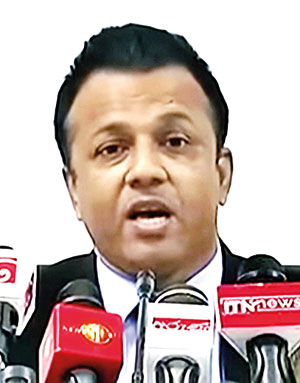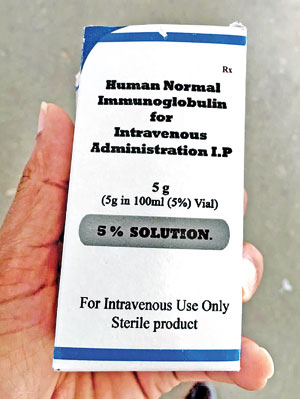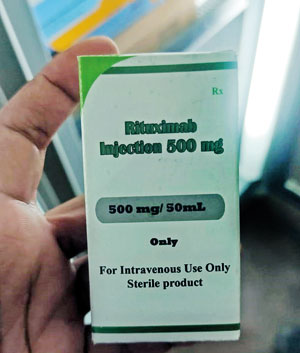News
Immunoglobulin saga: Every new morsel of info that emerges raises more questions than answers
View(s):By Namini Wijedasa
Health Authorities still don’t know what was in the human immunoglobulin 5g vials that were sold to its Medical Supplies Division (MSD) by a local company named Isolez Biotech Pharma AG, purportedly on the basis of “fake” waivers of registration (WoR) containing the “forged” signature and stamp of the National Medicines Regulatory Authority’s (NMRA) chief executive officer.
Two more drugs are revealed to have been ordered by the Health Ministry from Isolez Biotech. One was a monoclonal anti-cancer antibody called “Rituximab” which has now been withheld from use. The other is a medication that the NMRA did not name, saying it had not been supplied yet.

NMRA Board Member Dr. Manoj Gamage addressing a news conference
The Rituximab also had a “fake” WoR in the file, CEO Vijith Gunasekera said at a press conference on Wednesday.
Information about how many patients were administered the immunoglobulin has not been released. The MSD has taken an internal decision to place “under surveillance” till further notice all items supplied by Isolez Biotech.
No arrests have been made in this regard but the CID is expected to visit the NMRA offices tomorrow. And the Maligakanda Magistrate on Friday ordered the Criminal Investigation Department (CID) to arrest and produce in court before October 16, 2023, suspects who had supplied counterfeit medication to State hospitals on the basis of forged documents.
How many more?
Meanwhile, a leaked document shows that Isolez submitted to the MSD its first quotation for 7,500 packs of counterfeit human immunoglobulin as early as October last year, a full 12 months ago. The cost is stated as US$ 975,000 or Rs. 316mn. The vials started being distributed to hospitals in July.
This raises questions about whether other counterfeit medications from various suppliers have made their way into Sri Lanka’s public health sector; and whether there are “fake” documents in those files.
The regulatory mechanism was in shambles after the NMRA Board last year introduced a “special pathway” allowing the CEO to authorise waivers of registration without even submitting them to relevant NMRA committee. Hundreds of such WoRs were issued, by the regulator’s own admission.
But the full list of waivers remains heavily guarded. Multiple requests under the Right to Information (RTI), including one lodged by this writer, have not yielded the information.

Health Authorities still don’t know what was in the human immunoglobulin 5g vials that were sold to its Medical Supplies Division (MSD) by a local company named Isolez Biotech Pharma AG
The leaked quotation– which is addressed to the Additional Secretary of the Health Ministry–also reveals that Isolez planned to import “raw materials” for human immunoglobulin, purportedly as part of a contract manufacturing deal with India’s Livealth Biopharma Pvt Ltd. Isolez would also market the final product.
It remains unclear whether Isolez, therefore, received authorization to bring in human blood plasma, which is the raw material for this drug; whether it was then mixed and bottled in Sri Lanka.
Immunoglobulin is a blood-based medication that is usually manufactured and transported under stringent conditions. Despite repeated requests for Good Manufacturing Practices (GMP) certification for its factory, Isolez was not granted this facility by any NMRA Board, including this one. So who made the medication and where?
“How did this pass muster?” a senior consultant asked. “If the plan was to bring raw materials, even an ordinary doctor knows that the relevant factory must have stringent sterility criteria and cannot manufacture human immunoglobulin without approval which is a long process. There must be no contamination of any form and a strict cold chain must be maintained. Where were these vials filled?”
Every new morsel of information that emerges in this saga raises more questions than answers.
No records?
The NMRA says it has no records of a WoR request or any documents related to Isolez in its system. However, a letter written to the company in January 2023 by Health Secretary S. Janaka Sri Chandraguptha titled “Acceptance of Expressions of Interest to import and supply of vital and essential pharmaceuticals to Sri Lanka under the Indian Credit Line for 3 months” is also copied to the NMRA CEO.
Samples of the problematic human immunoglobulin are to be sent to the National Blood Transfusion Service to test for HIV, to the Medical Research Institute to test for allergens and a World Health Organisation-accredited facility for more detailed investigation, authoritative sources said.

Two more drugs are revealed to have been ordered by the Health Ministry from Isolez Biotech. One was a monoclonal anti-cancer antibody called “Rituximab” (above) which has now been withheld from use
Allegations of fake documents broke only after patients administered the immunoglobulin intravenous solution started to have adverse reactions. The NMRA claimed that it had found the questionable paperwork when it looked into MSD files after three hospitals–Matara, Matale and the National Hospital of Sri Lanka–complained.
Both Isolez letters and official Health Ministry documentation stated the manufacturer of the immunoglobulin was Livealth Biopharma Pvt Ltd of India (although there was no consistency in the way the name was constructed). Livealth confirmed to the Sunday Times it had nothing to do with Isolez and had neither supplied nor made the drug. It said the same of Rituximab.
Who is responsible?
The NMRA maintains it has nothing to do with the tender process, selection of products or companies, etc. It says that the NMRA Act authorises it to grant WoRs in exceptional circumstances–which, in this case, was the threat of a severe medicines shortage caused by the economic crisis and the need for speed to avoid such an emergency. It also justifies its position saying hundreds of WoRs were granted in the past.
But none of the NMRA representatives who attended this week’s press conference mentioned that the “special pathway” it carved out last year went over and above the terms set out in the law. It gave the CEO sole authority to authorise waivers on requests by the ministry. And the quantity of WoRs granted is much bigger than in previous years.
This also begs the question of why Isolez (if it was them) had bothered to forge WoRs, considering that these were being issued at an alarming rate by the NMRA from mid-last year. The authenticity of any other documents related to this case–including MSD papers as well as letters from the Health Secretary–has not been questioned.
The technical evaluation committee (TEC) that examined this procurement reportedly did not have a subject specialist, as is the usual practice. Why? Who appointed it? The TEC recommendation goes to the tender board for a final decision. The head of this board was Health Secretary Mr. Chandraguptha. What was his role in the procurement?
Questions also remain about where the money came from for payments. Although official documents, including Isolez quotation and the Health Secretary’s letter, indicate that this is an Indian Credit Line procurement, the protocol for settling dues related to tainted tenders such as these has not been defined. The full amount released for the immunoglobulin and the Rituximab is also not vailable as a lack of transparency continues to shroud health sector procurements.
What now?
After months of controversy, the NMRA said this week that it would be much more vigilant in the issue of WoRs in future. What is required now, however, is a forensic investigation of what happened over the past few months, health sector sources said.
At the press conference, the NMRA main thrust was that it did not consider itself responsible for tender irregularities. The request for WoRs comes right at the end of the procurement process, it insisted.
Its website says, however, that the NMRA will “thereby regulate, control manufacture, importation, storage, distribution, transportation, pricing, wholesale and retail sale, advertising, and disposal of medicines to ensure that medicines made available in the country are of good quality, efficacious, safe, and affordable” [sic].
Separately, there is no evidence of an internal inquiry at the Health Ministry. But the blame game is in full swing.
The best way to say that you found the home of your dreams is by finding it on Hitad.lk. We have listings for apartments for sale or rent in Sri Lanka, no matter what locale you're looking for! Whether you live in Colombo, Galle, Kandy, Matara, Jaffna and more - we've got them all!

